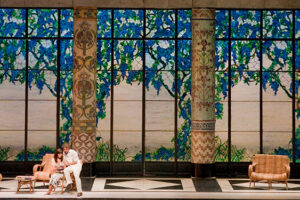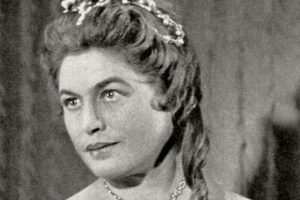

After opening the season with the doomed love of Tristan und Isolde and moving on in the autumn to the erotic separations of L’amour de Loin, Roméo et Juliette is a fitting addition to a season at the Met rife with tragic romance. With a libretto by Jules Barbier and Michel Carré, the opera is essentially a retelling of the famous Shakespeare play, which is itself a variation on the Pyramus and Thisbe myth from Ovid’s Metamorphoses.
It is quite a project to elevate such well-known material beyond the stock clichés we have all come to expect. However, Sher’s production is striking in that it makes effective use of the thresholds between private and public spheres, and the pressures, longings, and obligations that blur these distinctions.
From the very first chords of the opera, the chorus positions the plot within the domain of the communal: the vast and dignified generations of the Capulets and the Montagues deliver the prologue—large prominent families of Verona, their hatred for one another seething just beneath the surface.
From this sobering beginning, we are whisked away to the swirling, glittery bacchanal of a masked ball in 18th century Verona, which, with its notions of public and private personae, is the perfect setting for young and foolish love to flourish.

And so the private becomes public, and the political implications of personal experience become all the more evident. This clever approach to the opera makes even clearer how the two protagonists operate within a much larger, complex social structure than one initially realizes.
But beyond these theoretical concerns, Sher’s production is, at the most fundamental level, a good looking and well-produced evening of Music Theater—touchingly lit in dusky hues by Jennifer Tipton, and costumed sumptuously by Catherine Zuber. The staging feels organic and well choreographed, especially the more athletic fight scenes by B.H. Barry. And the evening moves briskly through the well-known plot points, never repetitive or overbearing in its ardor.
Central to this success, however, are the extremely likeable and (mostly) virtuosic performances of Diana Damrau and Vittorio Grigolo, as the eponymous lovers. They have a remarkably combustible chemistry together. Grigolo especially brings a pliant, richly supple sound to his role, with a smooth tenor that rings through the house. He is athletic, graceful, and handsome. Moreover, he possesses an electric charisma of Barihunk capacity.

Unfortunately, the supporting cast is less successful. Elliot Madore, good looking in the role of Mercutio, offers a rather simplistic reading of an emotionally complex figure. Moreover, his baritone sounds muted and diffused, devoid of any lyrical sparkle. And as his foil Tybalt, Diego Silva makes an inauspicious debut, with a serviceable tenor that doesn’t offend, but also fails to impress.
In the role of Frére Laurent, Michail Petrenko lacks the majesty suggesting the character’s moral gravitas. He looms about the stage, offering little security to the frazzled and harrowed lovers. And as Stephano, Virginie Verrez begins well, but makes a bit of a mess with the end of her “Que fais-tu”. Laurent Naouri is forgettable as Capulet.
However, these clunky performances couldn’t derail Sher’s expert direction, nor could they cool the febrile chemistry between the two leads. After such a gloomy year, it was nice to see some sparks fly in a Roméo et Juliette. Lovingly staged, and a vehicle for some rather excellent singing, this production is enough to make one feel optimistic. Here’s looking forward (knock on wood) to 2017.
Photos by Ken Howard/Metropolitan Opera.
























Comments